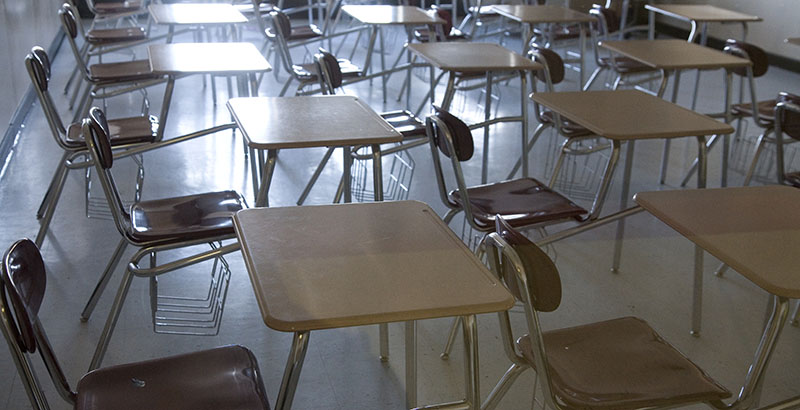Rotherham: From Homeschooling to the Digital Divide to Philanthropy, 10 Questions About COVID-19 and the Future of Education

Considering how little we still know about coronavirus, it’s striking how much certainty there is about different aspects of the crisis playing out in real time in front of us. The education world is no exception, where, despite a generally haphazard response, a surprising certitude about what will work or not work, or happen or not happen, pervades. And whether it’s ed tech boosters or teachers union leaders — surprise! — everyone’s take seems to line up with their priors from before the novel coronavirus struck, even as the situation seems to call for radical pragmatism.
The districts and charter school networks that are responding the best seem to have just one thing in common — a can-do spirit. Working with stakeholders in different parts of the country has made me certain only about the uncertainty. The impact in a few months or a few years still seems to hinge on collective action and policymakers’ decisions. But there will be an impact.
Here are 10 questions I’m watching:
1. What’s the effect on kids of the greater freedom they’re enjoying in terms of doing their schoolwork and structuring their days? Are we seeding a generation that will want more competency-based and self-directed approaches or, conversely, one that treasures the social and interactive aspects of school more?
2. What will the impact be if 5, 3 or even just 1 percent of parents decide they want something different after this? For instance, if they prefer homeschooling to their previous status quo? Or if they want less adherence to seat time and more of a mastery-based approach to learning? In our sprawling system of schooling, small percentages can still add up to big numbers.
3. A poll commissioned by the National Parents Union, not surprisingly, found that more than half of parents said they’re spending more time helping their children with their schoolwork than before the crisis. More than 4 in 10 are supplementing their kids’ lessons with other materials. One result of all this is that for the first time, a lot of parents are getting a sustained and focused look at the quality of work their kids are doing — and not everyone is happy about it. What is the impact of that, the longer this goes on?
4. Many people were responding to the pandemic before officials ordered closures, so we likewise shouldn’t assume universal compliance with school reopenings if coronavirus remains unchecked. When school does “reopen” in some form, what percentage of parents are not going to comply? What’s the plan for those families, and what’s the impact on teachers and classrooms?
5. How many students are not getting any formal learning at all right now? At Bellwether, we’ve used different data points to try to figure out a reliable number; anywhere from 7 million to 12 million seems a reasonable estimate. The range speaks to the uneven response across the education sector, as well as inequities in device and internet access. Even at the low end of that range, it’s an enormous crisis within this crisis because these students are the furthest from opportunity and can least afford sustained learning loss or lack of access to quality education.
6. Communities with a higher percentage of students in charter schools are being disproportionately impacted by the coronavirus (sorry, charter haters, that’s correlation, not causation). Given the demographics of charter schools, their families (and urban parents more generally) are being more affected from a health and employment standpoint than public school parents overall. What’s the downstream effect of that? Meanwhile, it seems likely that retail will not return to pre-coronavirus levels and that automation will become more prevalent. What’s the impact of that on lower-income public school parents?
7. It’s plausible that the coronavirus will have an adverse impact on commercial real estate as employers shrink their footprints and remote work becomes normalized. That’s an economic problem, but is there an upside for charter schools in cities where access to facilities has been a barrier to growth and expansion? Some interesting charter schools operate out of what a casual observer would consider office space, so if there is more available, it could be put to educational use.
8. Will education fare better in future federal aid packages? Big dollar figures are being touted, but beyond addressing the digital divide separating online haves and have-nots, what are the big ideas or compelling plans that political coalitions can rally behind?
9. Pensions. Long a marginal and politically toxic issue, the unrealistic promises, persistent underfunding and archaic design of teacher retirement systems will be impossible to ignore, barring an economic miracle. The first quarter of this year, which does not include the full blow of coronavirus, was historically grim. In the past, pension “reform” has meant making pension systems even less desirable for new teachers. Can policymakers buck politics and do better this time? Or is the education community too invertebrate to address a problem that is diverting 1 in 4 dollars from many high-need classrooms?
10. Where are the funders? Some funders are stepping up, publicly or behind the scenes, but overall, the education philanthropic community is not showing up proportionate to the biggest crisis of our lifetimes. Some philanthropic leaders are urging funders to do whatever it takes, including spending actual endowment dollars, but the collective response remains underwhelming as the sector faces an unprecedented fiscal and educational crisis. Is this a marathon rather than a sprint, or is our best opportunity to get in front of this crisis slipping away?
Andrew J. Rotherham is a co-founder and partner at Bellwether Education, a national nonprofit organization working to support educational innovation and improve educational outcomes for low-income students, and serves on The 74’s board of directors. In addition, among other professional work, he is a contributing editor at U.S. News & World Report, writes the blog Eduwonk.com, teaches at The University of Virginia and is a senior advisor at Whiteboard Advisors.
Get stories like these delivered straight to your inbox. Sign up for The 74 Newsletter

;)
